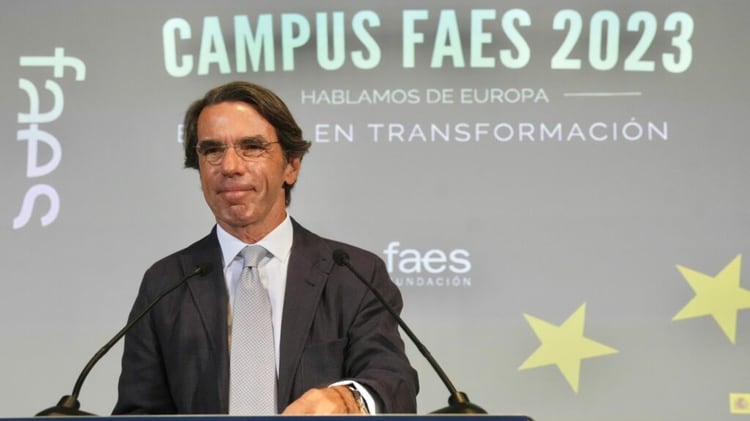The Diplomat
The Executive yesterday accused José María Aznar of “coup-mongering” behaviour, after the former Prime Minister made a call to mobilise against the amnesty that the Government of Pedro Sánchez is preparing for the fugitive Carles Puigdemont to support his investiture.
Aznar spoke at the opening of the FAES 2023 Course on the theme ‘Let’s talk about Europe. Europe in transformation’, but his words -after paying tribute to former minister Josep Piqué, who died a few months ago- were focused on the current situation in Spain.
The former head of the Executive between 1996 and 2004 attacked Sánchez’s proposals from the outset, asserting that the country is living through “dramatic times”, because, he said, “there is a certain existential risk for the continuity of Spain as a nation, as a political community of free and equal citizens and as a State under the rule of law applied by independent judges and courts”.
In Aznar’s opinion, “what is underway is an operation to dismantle the Constitution, to destroy its legitimacy, in short, to reverse a great success story”. And he considered that “the surrender of socialism to secessionism in exchange for maintaining power is in itself the most destructive act we have suffered in democratic politics”.
After recalling that this is not the first time that the strength of Spanish society has been put to the test, in a clear reference to terrorism and other separatist attempts, he indicated that “secessionism, driven by the Socialist Party, believes it has found its moment, the one that marks the point of no return towards the destruction of the Constitution”.
He assured that what Spain wants is to live “in the success of coexistence, of unity, of pluralism and of the law equal for all”, and added that no democratic state would accept “what they want to pass off as normal here”, which is an amnesty that makes “an attempted coup against constitutional normality” legitimate – and which is also “an invitation to do it again” – nor “a camouflaged self-determination” to form a government.
José María Aznar believes that “Spain accumulates civic energy, institutionalism and national critical mass to prevent this project of national dissolution from being consummated”. But in order to do so, he stressed, “we must once again say ‘Enough is enough! Spain will not return to a system based on exclusion, sectarianism or the planned destruction of the nation”.
The former President insisted that “no one with a sense of responsibility, committed to the historic agreement between Spaniards, can remain on the sidelines of a task that must summon us to ensure the future of Spain”.
Aznar’s words provoked an immediate reaction from Sánchez’s government, through the mouth of the spokesperson, Isabel Rodríguez, who, at the press conference following the Council of Ministers, did not hesitate to state that they are more akin to “anti-democratic and coup-like behaviour” than “those of a former president”, and considered them incompatible with the democratic and constitutional values of our country.
The government spokeswoman, who wondered whether the next thing will be “the call for an uprising”, called on the current president of the PP, Alberto Núñez Feijóo, to rectify these statements.
Furthermore, Rodríguez accused Aznar of lying to Spaniards after the jihadist attack in Madrid on 11 March 2004: “It was he who used the biggest terrorist attack on our country”, he said, adding that, for this reason, he has “little credibility and his statements have no political or even moral value”.
Núñez Feijóo’s response was to attack the government in office for “insulting” the former president. “The same government that, before losing the elections, branded the amnesty as inadmissible, now negotiates it with pro-independence supporters while insulting the former presidents who rebel against it”, he said on the social network “X”.
He added: “They did it with (Felipe) González and now with Aznar. Spain will not remain silent in the face of their immorality”.
The secretary general of the PP, Cuca Gamarra, in a message on “X”, replied to the spokeswoman for calling Aznar, a “democrat who is a victim of terrorism”, a “coup leader”, while “he is “entertaining fugitives” such as the former president of the Generalitat, Carles Puigdemont.
Elorza and Zarzalejos on Europe
In the first session of the FAES 2023 course, the PP MEP Javier Zarzalejos and the former ambassador permanent representative to the EU Javier Elorza spoke about the current situation in Europe and the six-month Spanish presidency of the EU.
Afterwards, the former Spanish ambassador to Ukraine, Silvia Cortés, the former government spokesperson, Pío Cabanillas, and the director of the Madrid Office of ECFR, Ignacio Torreblanca, analysed the main political and geopolitical consequences of the war in Ukraine for the EU and, in particular, for Spain.






